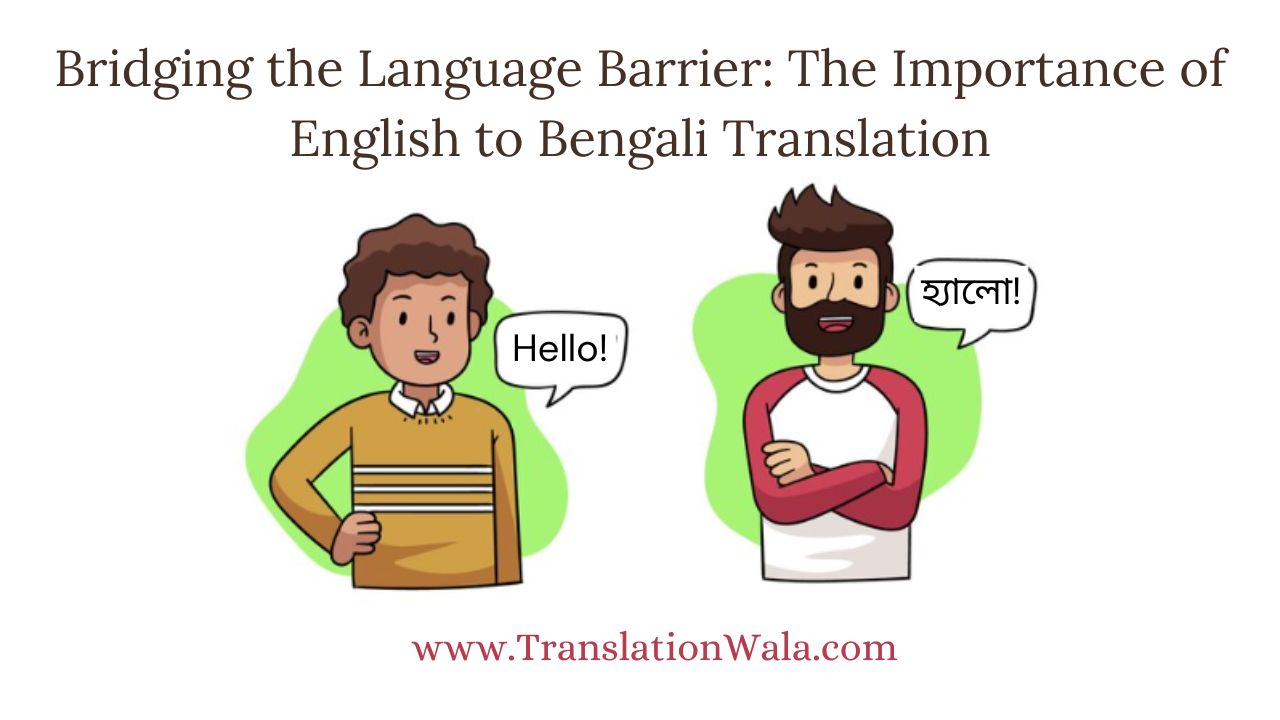For hundreds of years, languages have been both ways to bring people together and keep them apart. Today, when the world is getting smaller and smaller, it’s more important than ever to be able to understand and talk to people who speak different languages. This is especially true when it comes to the link between English and Bengali, two languages that are spoken by millions of people around the world and have cultural backgrounds that are different but linked. It is important to English to Bengali Translation so that people can understand each other, share thoughts, and work together.
Understanding the Need: A World of English and Bengali Speakers
Because people speak English everywhere and use it as the normal way to talk to people from other countries, it is important in many fields, like science, technology, education, and government. Bengali people who learn English can get better grades and jobs, learn more, and join talks around the world.
Bangladeshi, on the other hand, has its own way of seeing the world, a long past of literature, and lively cultural forms. More people can get these gems because they have been translated from Bengali to English. They make movies, music, writing, and other kinds of work better. Also, more than 265 million people in India, Bangladesh, and other places know Bengali. There are a lot of people in this group who can share their stories, thoughts, and experiences.
Also Read: Localizing Your Content for Gujarati-Speaking Users: The Power of English to Gujarati Translation
Challenges and Solutions: Overcoming the Gap
Many problems come up when you try to speak English and Bengali at the same time. Differences in language, words, and cultural details can make readings wrong or awkward, which makes it harder to communicate and understand. It can be especially hard to translate linguistic details and colloquialisms because you might lose the meaning or come up with new ones that you didn’t mean to.
Thanks to improvements in translation technology and the hard work of skilled translators, texts are becoming more accurate and detailed. Even though they are still being worked on, machine translation tools make simple conversation and summarizing material faster and easier to use. Human translators, who know a lot about both languages and cultures, are still needed to make sure the translation is correct, get to the heart of the source text, and make it work for the intended audience.
Benefits Beyond Words: The Impact of Translation
To translate from English to Bengali effectively, you need to do more than just change words for words. It’s strong enough to:
- Promote education and literacy: Bengali learners can get more information and chances from translated textbooks and other school materials, which can help them do well in school and grow as people.
- Boost economic and professional growth: Businesses can reach more people and interact with the Bengali market if their marketing materials and product details are translated correctly. Professionals can work together with people from other countries if they can communicate better in English.
- Strengthen cultural understanding: Literary versions let readers get lost in Bengali culture, literature, and history, which helps them understand and value other points of view.
- Empower communities: Bengali-speaking groups can be more involved in society and fight for their needs when they have access to translation tools and knowledge on healthcare, the law, and political involvement.
Also Read: Marathi Mastered: Demystifying English to Marathi Translation with Expert Tips
The Road Ahead: Building a Stronger Bridge
Building a strong and easy-to-use environment for English to Bengali Translation takes ongoing work from many groups. Important steps include funding programs to educate and train translators, building advanced translation tools, and setting up places where translated material can be shared. Supporting programs that promote culture exchange and pushing for bilingual schooling will help connect these two languages even more.
Helping others speak better, learning more about other cultures, and giving people and groups the tools they need to achieve in a linked world is what we can do by translating from English to Bengali. Moving closer to a world where everyone can hear and understand people who speak both English and Bengali is a good thing.
